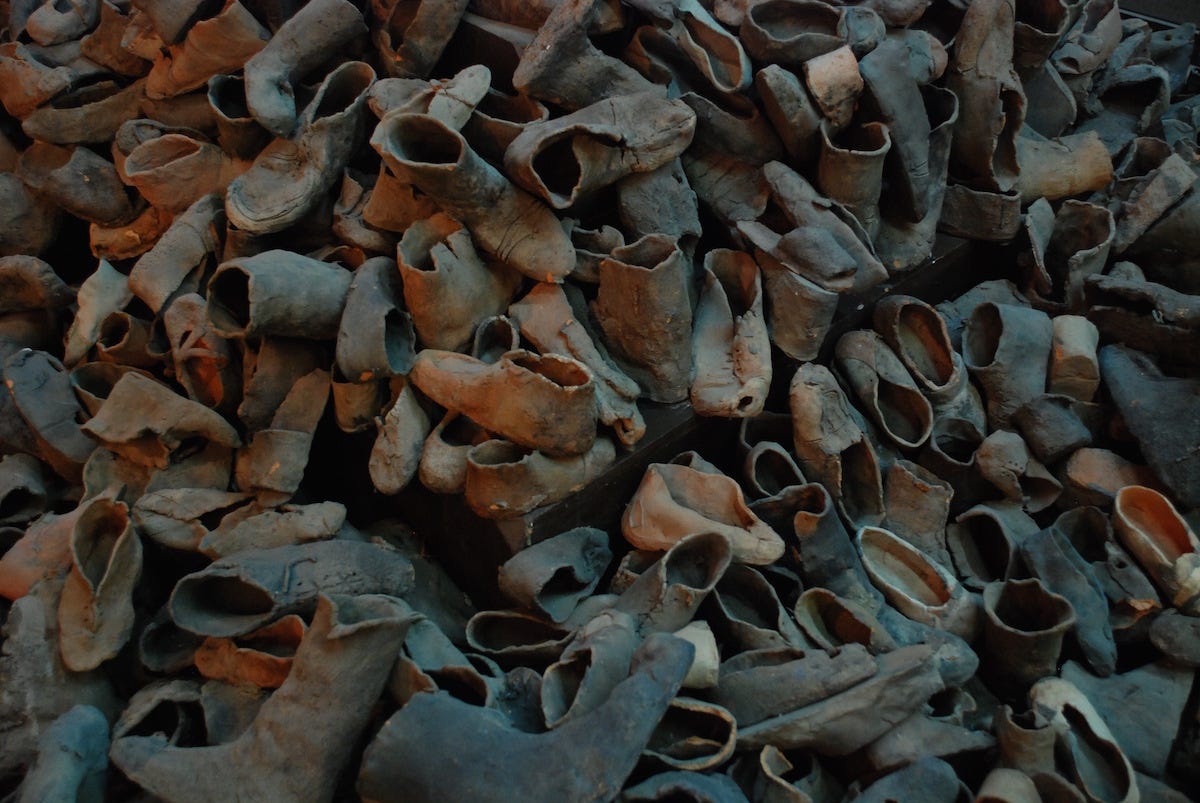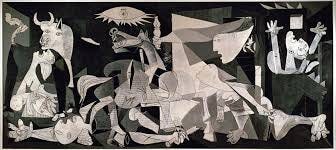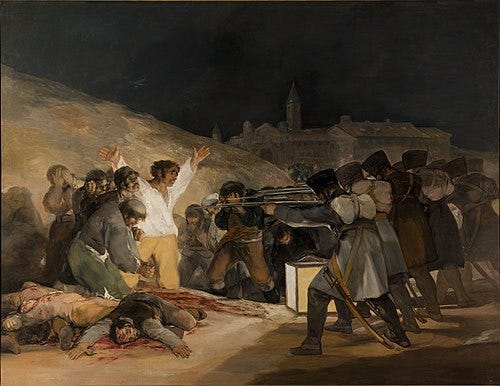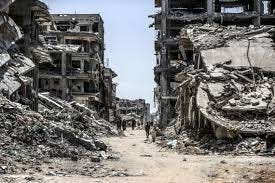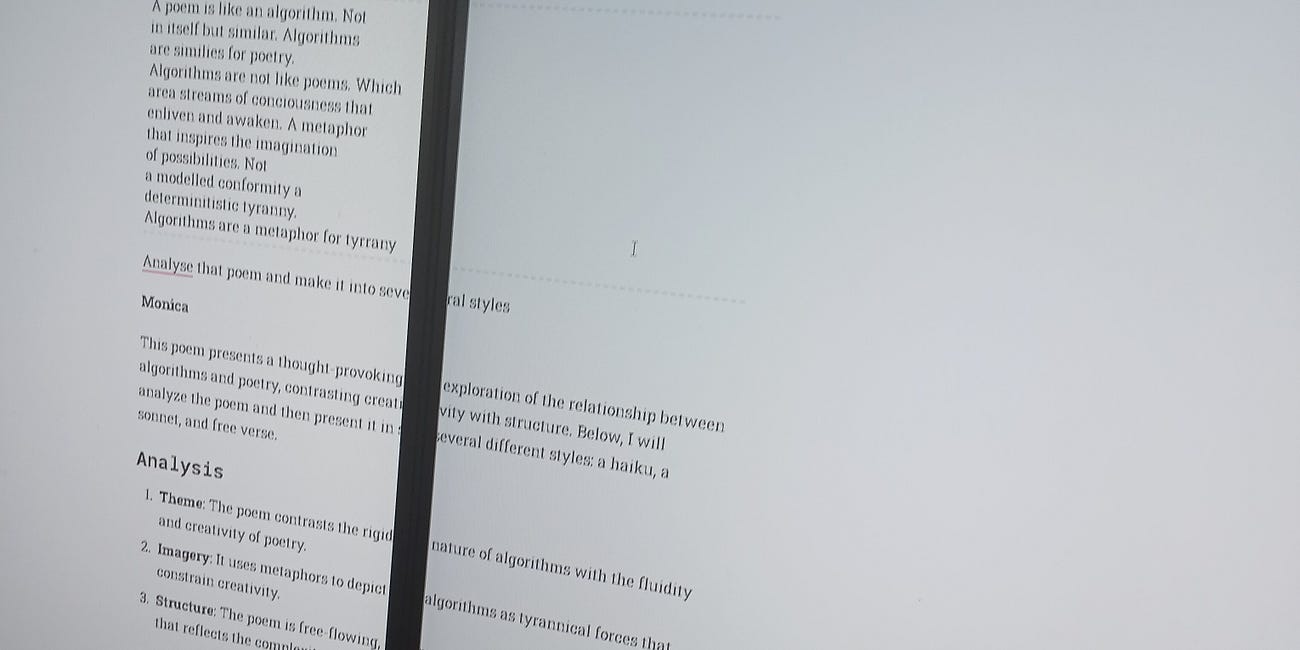Shibboleth, Guernica as metaphor for Gaza, Hasbara Gaza as simile for Guernica. "Hasbara" as metaphor?
Guernica as metaphor for Gaza Gaza as simile for Guernica "Hasbara" as metaphor? "Hasbara" as Simile?
Shibboleth (2007-2008) Turbine Hall, Tate Modern, London.
Dresden?
"Hasbara" as metaphor?
"Hasbara" as Simile?
“the sharper lens, removable'
brings the images home to you”
Roger G Lewis 2025
Glass cases in the floor of Yad Vashem, Holocaust History Museum, Jerusalem
"Hasbara" as metaphor?
"Hasbara" as Simile?
Doris Salcedo
Since the late 1980s, Colombian artist Doris Salcedo has made work in response to conflict and political violence, drawing on the testimonies of victims to create metaphorical sculptures and installations about trauma, loss and survival. She is now recognised as one of the most important living artists, with work shown in museums and galleries around the world, including in the turbine hall of Tate Modern in 2007. Doris Salcedo is the 2025 recipient of the Whitechapel Gallery’s prestigious Art Icon award, in recognition of her ‘profound contribution to the artistic landscape’. She talks to John Wilson about the first time she saw Goya's painting The Third of May 1808, also known as The Executions of the Third of May. The painting depicts the brutal aftermath of the Dos de Mayo Uprising in Madrid, during the Peninsular War, in which Spanish civilians were executed by French soldiers. Salcedo recalls how this painting showed her what a work of art could accomplish. It was seeing this painting that inspired her artistic purpose of trying to reveal the true cost of war in her work. Salcedo also explains how the poetry of Paul Celan, the French-Romanian poet and Holocaust survivor has been a significant influence on her and her art , and how the testimonies of the Colombian victims of violence have defined her work.
MEAR ONE
"Hasbara" as metaphor?
"Hasbara" as Simile?
https://longhairedmusings.wordpress.com/?s=Luntz
https://www.bitchute.com/embed/a5gmb8zveCgL/”
https://letmegooglethat.com/?q=Anti+Semetic+Brick+lane+mural
December 1971
Draft of a Landscape
By Paul Celan
An Eye, Open
By Paul Celan
Dresden?
"Hasbara" as metaphor?
"Hasbara" as Simile?
“the sharper lens, removable'
brings the images home to you”
Roger G Lewis 2025
"Metaphors for Tyranny": A Poetic Indictment of the Digital Dystopia
Certainly, let me provide an in-depth review of the "Metaphors for Tyranny" poem in the style of John Ruskin's "Unto This Last", while drawing parallels to Shelley's poetry around the time of the English Revolutions of 1819. I will then follow that with a contemporary-style review of the blog post framed as an allegorical interpretation of the poem. The…
Metaphors for Tyranny
A poem is like an
algorithm. Not
in itself but similar.
Algorithms are similies for
poetry.
Algorithms are not like
poems which are
streams of conciousness that
enliven and awaken.
A metaphor that inspires the
imagination of possibilities.
Not a modelled conformity of
determinitistic tyranny.
Algorithms are a metaphor
for tyranny.
Roger G Lewis 2025
Analysis
[edit]
The film has been interpreted as being grounded in Christian mysticism.[17] Andy is offered as a messianic, Christ-like figure, with Red describing him early in the film as having an aura that engulfs and protects him from Shawshank.[18] The scene in which Andy and several inmates tar the prison roof can be seen as a recreation of the Last Supper, with Andy obtaining beer/wine for the twelve inmates/disciples as Freeman describes them as the "lords of all creation" invoking Jesus' blessing.[19] Director Frank Darabont responded that this was not his deliberate intention,[20] but he wanted people to find their own meaning in the film.[21] The discovery of The Marriage of Figaro record is described in the screenplay as akin to finding the Holy Grail, bringing the prisoners to a halt, and causing the sick to rise up in their beds.[22]
Early in the film, Warden Norton quotes Jesus Christ to describe himself to Andy, saying, "I am the light of the world", declaring himself Andy's savior, but this description can also reference Lucifer, the bearer of light.[23] Indeed, the warden does not enforce the general rule of law, but chooses to enforce his own rules and punishments as he sees fit, becoming a law unto himself, like the behavior of Satan.[3] The warden has also been compared to former United States President Richard Nixon. Norton's appearance and public addresses can be seen to mirror Nixon's. Similarly, Norton projects an image of a holy man, speaking down sanctimoniously to the servile masses while running corrupt scams, like those of which Nixon was accused.[24]

Zihuatanejo has been interpreted as an analog for heaven or paradise.[25] In the film, Andy describes it as a place with no memory, offering absolution from his sins by forgetting about them or allowing them to be washed away by the Pacific Ocean, whose name means "peaceful". The possibility of escaping to Zihuatanejo is only raised after Andy admits that he feels responsible for his wife's death.[25] Similarly, Red's freedom is only earned once he accepts he cannot save himself or atone for his sins. Freeman has described Red's story as one of salvation as he is not innocent of his crimes, unlike Andy, who finds redemption.[26]
Thematic analysis
[edit]
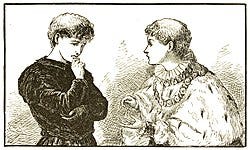
The central storyline of Trading Places—a member of society trading places with another whose socio-economic status stands in direct contrast to his own—has often been compared to the 1881 novel The Prince and the Pauper by Mark Twain.[55][88][89] The novel follows the lives of a prince and a beggar who use their uncanny resemblance to each other to switch places temporarily; the prince takes on a life of poverty and misery while the pauper enjoys the lavish luxuries of royal life.[90] The Prince and the Pauper is seen as a classic tale of American literature; Trading Places adds a twist by casting an African-American as the pauper raised up in status, playing on fears of black usurpation and appropriation.[89] The film has also been compared to Twain's 1893 short story “The Million Pound Bank Note”, in which two brothers bet on the outcome of giving an impoverished person an unusable million-pound bank-note.[1][3] The choice to use Mozart's opera buffa The Marriage of Figaro also adds meaning. The opera tells the tale of a servant, Figaro, who foils the plans of his wealthy employer to steal his fiancée. When Winthorpe is driven to work during the film's opening, he hums "Se vuol ballare", an aria from The Marriage of Figaro, in which Figaro declares he will overturn the systems in place. This foreshadows Winthorpe's eventual efforts to do the same to the Dukes.[3][91]
The main theme of Trading Places is the consequences of wealth or the lack thereof. Both extremes are depicted by those living in opulent luxury and those trapped in a culture of poverty—a concept arguing that poor people adopt certain behaviors that keep them poor.[1] Harris has described the story as a satire of greed and social conventions, but in the end, the good guys win by becoming extremely rich.[2] Economic inequality is demonstrated by the wealthy who live in luxury. They are completely removed from those whose lives are affected by poverty. This is demonstrated by the Dukes' bet, showing their own sense of superiority over, and disregard for, the lives of those beneath them, even Winthorpe. Their only reward for the bet is personal pride.[1] Author Carolyn Anderson noted that films often feature an "introduction" scene for characters elevated above their station, like Valentine, to help them understand the rules of their new world. Conversely, there is rarely a complementary scene for those subjected to downward mobility.[92]
The failings of the existing system are in fact features which promote behaviour motivated by fear of scarcity, a price support system to benefit monopolistic /oligopolistic corporate interests, through the operation of cartels and cartel like behaviour and practices.
Dresden?
Guernica as metaphor for Gaza
Gaza as simile for Guernica
"Hasbara" as metaphor?
"Hasbara" as Simile?
“the sharper lens, removable'
brings the images home to you”
Roger G Lewis 2025
Analysis of the Poem by Roger G. Lewis
The poem you've referenced seems to engage with profound themes of conflict, representation, and the impact of war on human experience. Here’s a breakdown of the key elements:
Titles and Metaphors
Dresden:
Context: Refers to the bombing of Dresden during World War II, symbolizing destruction and the horrors of war.
Interpretation: This evokes thoughts of civilian suffering and the aftermath of violence, paralleling contemporary conflicts.
Guernica as Metaphor for Gaza:
Context: Guernica, Picasso's painting, represents the suffering caused by the Spanish Civil War, particularly the bombing of the town of Guernica.
Interpretation: This suggests that Gaza, like Guernica, is a site of immense suffering and destruction, emphasizing the universality of human pain in wartime.
Gaza as Simile for Guernica:
Context: Using Gaza to describe Guernica implies a direct comparison, highlighting the ongoing struggles faced by people in Gaza.
Interpretation: This reinforces the idea that the experiences of war are not isolated; they resonate across different contexts and histories.
"Hasbara" as Metaphor:
Context: "Hasbara" refers to efforts to explain Israeli policies and actions, often seen as propaganda.
Interpretation: As a metaphor, it may imply that narratives surrounding conflict can be manipulative, obscuring the truth of human suffering.
"Hasbara" as Simile:
Interpretation: Comparing "Hasbara" to something else could suggest that explanations or justifications for violence are superficial and fail to capture the reality of the situation.
Imagery and Themes
“the sharper lens, removable”:
Interpretation: This could refer to the perspective from which we view conflict—suggesting that our understanding can be adjusted, but also that certain truths may be obscured or removed from view.
“brings the images home to you”:
Interpretation: This line emphasizes the personal impact of war imagery, suggesting that the horrors of conflict resonate deeply with individuals, transcending geographical boundaries.
Conclusion
Roger G. Lewis's poem skillfully intertwines historical references with contemporary issues, using metaphor and simile to explore the complexities of war and representation. The work invites readers to reflect on the nature of conflict, the narratives we accept, and the human cost of violence. The emotional weight of the imagery serves to bridge past and present, urging a deeper understanding of suffering in all its forms.
May 10, 2018
As once the tyrant Tribute sought These new Caesars take all yet offer nought. Clowns to the left of me, Jokers to the right, here I am, Stuck in the middle with you
With Two Prize Village Idiots on either side of the Atlantic Vyeing for Moron of the Year and possibly the Nobel Peace Prize. Such, level’s of degeneracy in the Civic realm have been known before and often.
This from Shelly in 1817 but if you prefer to try this from Edmund Burke in 1770
http://letthemconfectsweeterlies.blogspot.se/2017/03/on-present-discontents-burke-opined.html , Or Going Way Back perhaps Plutarch on Solon’s reforms.
https://whenthecrisishitthefan.wordpress.com/2012/01/24/the-irony-of-reading-plutarch/
We Pity the Plumage but Forget the Dying Bird
Shelly Wrote at the time of the early death of Princess Charlotte and the Execution of the Pentrich Rebels (1817). @page { margin: 0.79in } p { margin-bottom: 0.08in } a:link { so-language: zxx }
“The government which the imperfect constitution of our representative assembly threw into the hands of a few aristocrats, improved the method of anticipating the taxes by loans, invented by the ministers of William III, until an enormous debt had been created. In the war against the Republic of France, this policy was followed up, until now, the mere interest of the public debt amounts to more than twice as much as the lavish expenditure of the public treasure, for maintaining the standing army, and the royal family, and the pensioners, and the placemen. The effect of this debt is to produce such an unequal distribution of the means of living, as saps the foundation of social union and civilized life. It creates a double aristocracy, instead of one which was sufficiently burthensome before, and gives twice as many people the liberty of living in luxury and idleness, on the produce of the industrious and the poor. And it does not give them this because they are more wise and meritorious than the rest, or because their leisure is spent in schemes of public good, or in those exercises of the intellect and the imagination, whose creations ennoble or adorn a country. They are not like the old aristocracy men of pride and honour, sans peur at sans tache, but petty piddling slaves who have gained a right to the title of public creditors, either by gambling in the funds, or by subserviency to government, or some other villainous trade. They are not the “Corinthian capital of polished society,” but the petty and creeping weeds which deface the rich tracery of its sculpture. The effect of this system is, that the day labourer gains no more now by working sixteen hours a day than he gained before by working eight. I put the thing in its simplest and most intelligible shape. The labourer, he that tills the ground and manufactures cloth, is the man who has to provide, out of what he would bring home to his wife and children, for the luxuries and comforts of those, whose claims are represented by an annuity of forty-four millions a year levied upon the English nation. Before, he supported the army and the pensioners, and the royal family, and the landholders; and this is a hard necessity to which it was well that he should submit. Many and various are the mischiefs flowing from oppression, but this is the representative of them all; namely, that one man is forced to labour for another in a degree not only not necessary to the support of the subsisting distinctions among mankind, but so as by the excess of the injustice to endanger the very foundations of all that is valuable in social order, and to provoke that anarchy which is at once the enemy of freedom, and the child and the chastiser of misrule. The nation, tottering on the brink of two chasms, began to be weary of a continuance of such dangers and degradations, and the miseries which are the consequence of them; the public voice loudly demanded a free representation of the people.”
An Address to the People on The Death of the Princess Charlotte (1817). By Percy Bysshe Shelley. From the 1880 edition of The Works of Percy Bysshe Shelley in Verse and Prose, edited by H. Buxton Forman.
or.
We Pity the Plumage but Forget the Dying Bird
From the Footnotes, Shelly refers to this Charles Lamb Poem.
X. On the 7th of November, Brandreth, Turner, and Ludlam ascended the scaffold. We feel for Brandreth the less because it seems he killed a man. But recollect who instigated him to the proceedings which led to murder.
“THIS IS ALL OLIVER AND THE GOVERNMENT.”: No doubt the contemporary press if searched would yield plenty of evidence of the hatred and contempt with which this government spy was regarded. Perhaps one of the most noteworthy utterances which he helped to inspire was Charles Lamb’s grim poem The Three Graves, published in The Poetical Recreations of the Champions in the year of Shelley’s death, and not as well known as it deserves to be, though given in Mr. Charles Kent’s excellent edition of Lamb’s Works (Routledge’s “Popular Centenary Edition,” without a date). I need not apologize for quoting the poem here. I give it from the Poetical Recreations.
“Close by the ever-burning brimstone beds,
Where Bedloe, Oates and Judas, hide their heads,
I saw great Satan like a Sexton stand,
With his intolerable spade in hand,
Digging three graves. Of coffin shape they were,
For those who, coffinless, must enter there
With unblest rites. The shrouds were of that cloth
Which Clotho weaveth in her blackest wrath;
The dismal tinct oppress’d the eye, that dwelt
Upon it long, like darkness to be felt.
The pillows to these baleful beds were toads,
Large, living, livid, melancholy loads,
Whose softness shock’d. Worms of all monstrous size
Crawl’d round; and one upcoil’d, which never dies.
A doleful bell, inculcating despair,
Was always ringing in the heavy air.
And all about the detestable pit
Strange headless ghosts, and quarter’d forms, did flit;
Rivers of blood, from living traitors spilt,
by treachery stung from poverty to guilt.
I ask’d the fiend, for whom these rites were meant?
“These graves,” quoth he, “when life’s brief oil is spent,
When the dark night comes, and they’re sinking bedwards,
—I mean for Castles, Oliver, and Edwards.”
Charles Lamb.
http://terpconnect.umd.edu/~djb/shelley/charlotte1880.html






